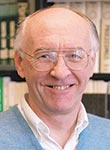Engineering professor emeritus Fred Kulhawy dies at 71

Fred Kulhawy, professor emeritus of civil and environmental engineering in the College of Engineering, died May 12 at age 71.
Kulhawy joined the faculty of the School of Civil and Environmental Engineering in 1976 as an associate professor. In 1980, he joined Cornell’s graduate faculty in geological sciences. By 1981, he had become a full professor.
During his 40-year academic career, Kulhawy taught a wide range of courses in geotechnical engineering, including basic to advanced soil mechanics, engineering geology, basic to advanced foundation engineering, retaining structures and slopes, rock mechanics and engineering, embankment dam engineering, tunnel engineering, case studies and reliability-based foundation design. He supervised the annual Master of Engineering geotechnical design project 17 times. Oriented toward design and professional practice, his courses emphasized a strong grounding in the basics and developing a sound thought process.
He was a prolific researcher throughout his academic career, with sponsors ranging from various government agencies to public and private companies, and he supervised 54 master’s and doctoral theses. Authoring or co-authoring more than 370 publications, Kulhawy and his students have greatly influenced geotechnical practice.
Among his many awards: distinguished member of the American Society of Civil Engineers (ASCE); the ASCE’s Norman Medal; and the Karl Terzaghi Award, the ASCE Geo-Institute career accolade for eminence in geotechnical engineering.
Fred Howard Kulhawy was born in Topeka, Kansas, Sept. 8, 1943. He received his B.S.C.E. in 1964 from Newark College of Engineering (NCE, now part of New Jersey Institute of Technology). He was a part-time instructor and researcher at NCE, from which he also earned his M.S.C.E. in 1966.
In 1966, he became a project engineer with Storch Engineers, a small geotechnical consulting firm, where he worked on a series of challenging projects. They included the design of a major section of the New Jersey Turnpike expansion, the foundations for the Boston Aquarium, rehabilitation of portions of the Jefferson Memorial and various bridge foundations along interstate highways in Connecticut and New Jersey.
In September 1966, Kulhawy and his wife, Gloria, headed to California to further their education. At the University of California, Berkeley, he focused on geotechnical engineering, geology and geomechanics, while also learning about the then-new finite element method. He finished his doctorate in September 1969. His dissertation was one of the early applications of finite elements in nonlinear geotechnical construction problems.
Within days of completing his doctorate, Kulhawy became an assistant professor at Syracuse University, where he was promoted to associate professor in 1973. He also worked at Raamot Associates, a small geotechnical consulting firm in New York City.
After his retirement, Kulhawy kept active in his consulting practice, as well as travelling to indulge one of his passions, opera. He is survived by his wife, a brother, sister-in-law, nieces, a nephew and cousins.
There are no services. In lieu of flowers, donations can be made to Hospicare, 172 East King Road, Ithaca, NY 14850, or a charity of one’s choosing.
Media Contact
Get Cornell news delivered right to your inbox.
Subscribe